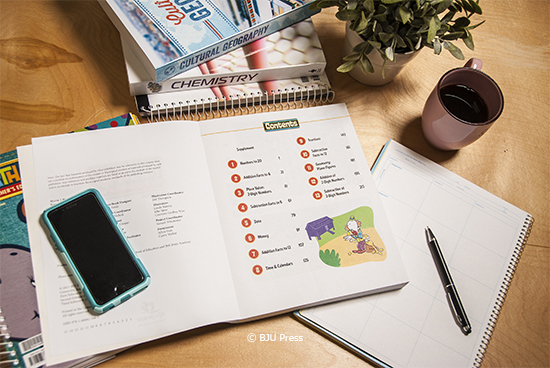
“Planning your work and working your plan” helps with more than scheduling your errands—it can make a big difference in organizing your teaching too. Whether you homeschool your children or teach a classroom of students, you probably begin each school year armed with a plan. It’s much easier to complete the different subjects and lessons when you have a plan to follow.
What should you consider when creating next year’s academic road map? Here are two ideas to get you started.
1. Start at the beginning.
A great place to start planning your lessons is by looking at the beginning of your textbooks. Review the table of contents in each textbook to see how it is paced and when concepts are presented. You’ll also want to see if your curriculum provides any lesson objectives or goals. Some of our BJU Press textbooks present the goals or objectives at the beginning of the textbook and others at the beginning of each chapter. Make sure to take good notes on what you find and consult your school calendar—you don’t want to start a harder concept right before a break.
2. Personalize to meet your student’s needs.
To tailor your plan, check your students’ test scores. Test scores are incredibly useful for showing strengths and weaknesses, letting you know what to spend more or less time on when teaching.
- The percentile ranks and stanines at the top of the score report show your student’s overall ranking in a subject or as a whole.
- The lower half of the score report shows a close-up of your student’s performance with specific skills. Check the number of questions that were available for each skill, and how many your student attempted. Missing 25% of only four questions means your student missed one question; missing 25% on a section of twelve questions would be more significant.
Tip—Don’t be afraid to ask for help. If you’re not sure what the test scores mean, need help pinpointing a possible weakness, or can’t find your test scores, talk to your achievement test provider. Our Testing & Evaluation service provides customers with unlimited access to test score reports, and staff members are happy to answer questions or consult on score results. Your test provider may offer the same service, so be sure to ask.
Apply your findings
For your student’s strengths, it’s okay to move more quickly through new material, include projects that encourage your student to apply his knowledge, or do a bit of both. For his weaknesses, it’s best to plan on spending more time reviewing old concepts and explaining new ones.
How do you usually plan for the school year?
• • • • •
Joanna received her BA and MA from BJU and worked at BJU Press Testing & Evaluation for over 19 years. She currently edits elementary science materials for BJU Press.
Leave a Reply